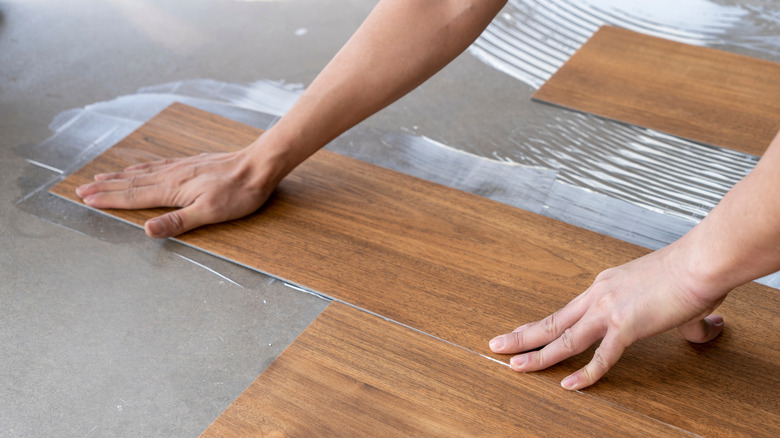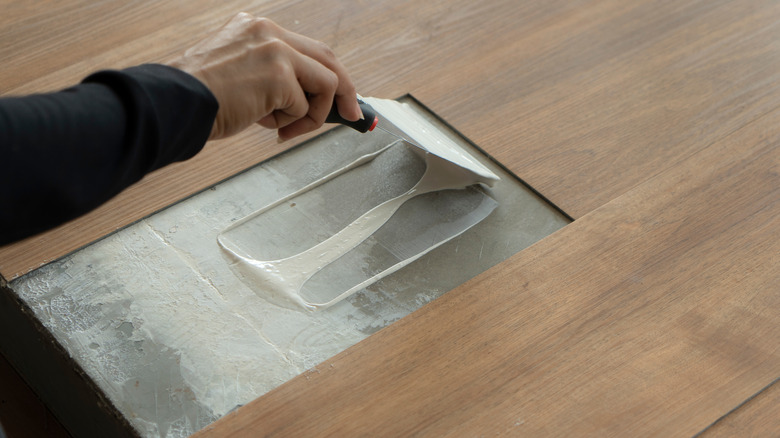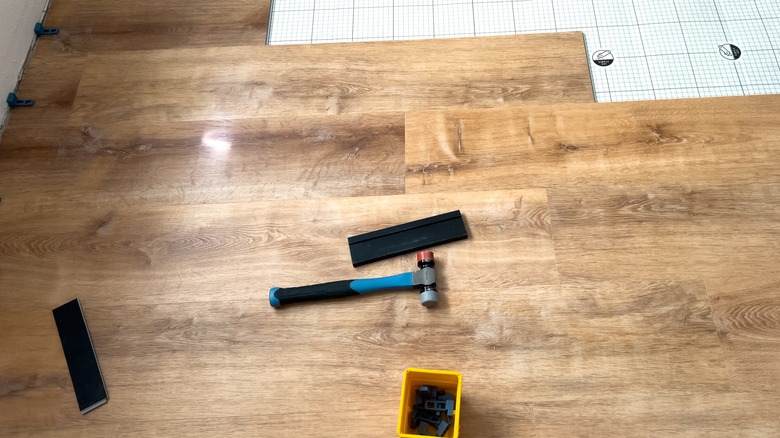Glue Down Vs Floating Vinyl Flooring: Which Is Right For Your Project?
From a certain point of view, there's no such thing as a clear-cut decision. If one option were better than others in every way, there'd be no need for those particular options. But in reality, there are tradeoffs with any decision, and it can be difficult to cut through the layers of marketing hype, mistaken online information, and other factors that make choices confusing. And so it is with the choice between glue down and floating vinyl flooring. As with the choice between sheet and plank vinyl flooring, the answer can be complicated. We got to the bottom of it by putting our questions to an expert. Skylar Bartlett, owner of Kreer Construction, told House Digest exclusively when to choose glue down, when to use floating floors, and why.
"Both are popular in their respective areas," Bartlett said. "Glue down vinyl is much more popular with gyms and restaurants for instance, while floating vinyl is much more popular with the average homeowner." There are, of course, a variety of reasons this is true. Bartlett explained, "Glue down is thinner and typically has a thicker wear layer than some floating options. It's meant to be glued directly to the subfloor, with no padding or underlayment. Floating vinyl flooring on the other hand usually has some type of pad, cork, etc. attached to the planks themselves, which is great for comfort and sound absorption. These planks are typically thicker and feature a click and lock system that lets them snap together easily."
Strengths and weaknesses of glue down vinyl flooring
Of course, this doesn't mean that glue down flooring can't be used in a residence — only that it isn't usually the best option. Vinyl is among the best flooring options for homes with children, and many of us have looked at the wear brought to bear by children, pets, and the great outdoors' habit of coming indoors and thought maybe a commercial floor is just what we need, and glue down vinyl flooring might be a great choice in a space like a garage. Usually, though, it's an unnecessary approach. "Glue down is best for commercial areas with heavy traffic and anywhere a durable floor is needed, like building entrances and elevators, for example," Skylar Bartlett told House Digest exclusively.
There are, of course, other factors besides durability. "Glue down floors, while strong, are not forgiving when it comes to the subfloor," Bartlett said. "So, if you have lumps and bumps you will see those through the floor." This might give pause to a DIYer who doesn't have access to all the tools and training of a pro. There's also a hidden cost issue that doesn't stay hidden for long after you buy your flooring. "Some people find themselves drawn to glue down options because of the cheaper price point, but they often forget to factor in the cost of glue as well, which can easily double your cost depending on how much you need." Bartlett explained.
Strengths and weaknesses of floating vinyl flooring
"Floating floors are better for residential areas," Skylar Bartlett told House Digest in our exclusive interview. "They're also great for DIYers due to their ease of installation. They can be a great upgrade to bedrooms, living rooms, and kitchens, just to name a few." But to say that floating is usually best for homes doesn't mean there aren't things to be on the lookout for. Careful installation, for example, is still important. "Floating floors can be a bit more forgiving in terms of showing little bumps," Bartlett said. "However, it's still recommended to have as level of a surface as possible so that the boards don't crack."
And sometimes taking care in flooring selection and installation is even more important than the glue-down-versus-floating decision itself, such as choosing waterproof flooring for areas (like kitchens and bathrooms) that get wet frequently, and reserving "water resistant" floors for rooms that might experience occasional, minor spills. Bartlett also noted that you can take apart a floating floor to dry in the case of a major leak or flood. Which sounds like another argument for floating vinyl, really.


